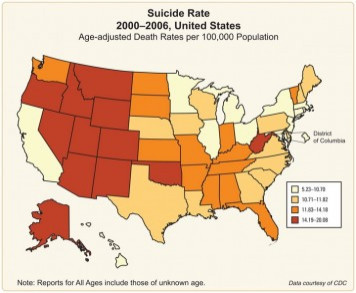Study Links Church Membership To Lower Suicide Risk, Gun Ownership And Conservative Ties To Higher Risk

Results from a recent gun ownership study show church attendance can save lives.
The study, conducted by sociology professor Augustine J. Kposowa of the University of California, Riverside, examined how suicide risk is linked to gun ownership, politically conservative leanings and church membership.
“In states with a higher percentage of the population that belongs to a church, it is plausible that religious views and doctrine about suicide are well-known through sacred texts, theology or sermons, and adherents may be less likely to commit suicide,” Kposowa told UCR Today.
Kposowa’s study, “Association of suicide rates, gun ownership, conservatism and individual suicide risk,” was published in February. Whereas past studies have linked gun ownership to suicide in one or two counties, Kposowa’s research was the first to use a national representative sample to determine the level of suicide risk.
He examined national mortality data for the years 2000 through 2004 and combined that information with state-level figures including gun ownership, suicide rate, church membership, immigration rate and political conservatism. The latter was measured using the percentage of those who voted for former President George W. Bush in the 2000 general election.
The study found that most of the states with high gun ownership, like Alaska, Montana, Wyoming, Idaho, Alabama and West Virginia, had high suicide rates and voted for George W. Bush. The research also showed that church membership at the state level reduced a person’s odds of committing suicide.
A similar study conducted in Canada examined the role of religious worship in suicide prevention. The 2009 study concluded that religious worship attendance was linked to a decrease risk in suicide attempts, Daniel Rasic, primary author of the study, told the Christian Post.
The CDC points to family and community support as a way to prevent someone from taking their own life. The World Health Organization published similar findings, citing church associations as a protective factor that can prevent suicidal behavior.
In the United States, suicide is one of the leading causes of death. In 2010, 38,364 people killed themselves -- an average of 105 people a day. More than 50 percent of suicide deaths were from guns.
Linking gun ownership to suicide is nothing new.
Firearms, which are used in more than half of all suicides in the United States, are considered a risk factor when they’re in the home, according to the National Institute of Mental Health.
A Harvard study published in 2006 showed that reducing household gun ownership may reduce suicide, especially among youth. Several studies draw similar conclusions.
Some argue there’s more factors involved than the correlation between owning a gun and taking one’s life.
Gary Kleck, a professor of criminology at Florida State University in Tallahassee, points to a gun owner’s mental state as a contributing cause for self-harm, he told the New York Times.
“It’s not the guns, it’s the person,” Sharon Wells, who lost her 16-year-old adoptive grandson, Kyle, when he shot himself with her gun in October, told the New York Times.
He was born with fetal alcohol syndrome and was bullied throughout his childhood, Wells said. If he didn’t use a gun, he would have found another method to end his life, she told the news outlet.
Kposowa recognized the political undertones his study alludes to.
Millions of Americans believe guns in homes protect them from intruders when research has shown guns are often used on household members either in homicides or suicides, Kposowa told UCR Today.
“Adding to the widespread misinformation about guns is that powerful pro-gun lobby groups, especially the National Rifle Association, seem to have a stranglehold on legislators and U.S. policy,” he said. And without changes in gun ownership policies “the United States is poised to remain a very armed and potentially dangerous nation for its inhabitants for years to come.”
© Copyright IBTimes 2024. All rights reserved.






















